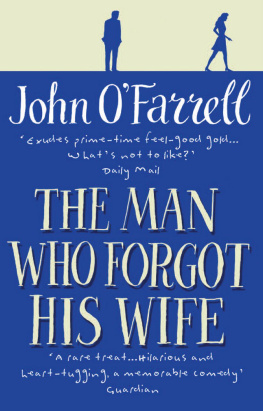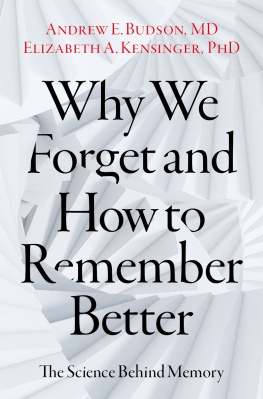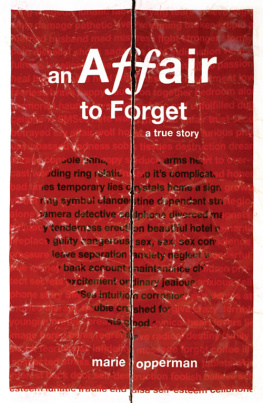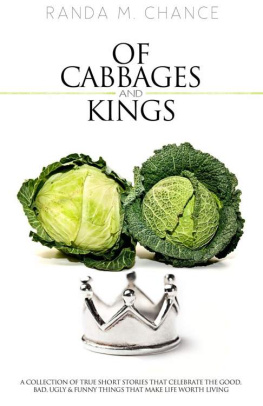About the Book
Lots of husbands forget things: they forget that their wife had an important meeting that morning; they forget to pick up the dry cleaning; some of them even forget their wedding anniversary.
But Vaughan has forgotten he even has a wife. Her name, her face, their history together, everything she has ever told him, everything he has said to her it has all gone, mysteriously wiped in one catastrophic moment of memory loss. And now he has rediscovered her only to find out that they are getting divorced.
The Man Who Forgot His Wife is the funny, moving and poignant story of a man who has done just that. And who will try anything to turn back the clock and have one last chance to reclaim his life.
Contents
THE MAN WHO
FORGOT HIS WIFE
John OFarrell
For Lily
Chapter 1
I REMEMBER WHEN I was a child I used to watch Mr & Mrs. We all did; it seemed like the only option available, so everyone just put up with it. A bit like all those marriages on the programme, now I think about it. Obviously Mr & Mrs wasnt the cultural highlight of our week; we didnt all rush to school next morning and share our outrage that Geoff from Coventry didnt know that Julies favourite foreign food was spaghetti. But unquestioningly we just watched the procession of unglamorous couples go through the minor embarrassment of revealing all the little things that they didnt know about each other. Or, worse still, that there werent any.
If ITV had wanted to increase the ratings a bit, perhaps they should have done a little more covert research about the big stuff the partners really didnt know. So, Geoff, for tonights star prize, do you think that Julies favourite way to spend a Saturday night is: (a) Watching television? (b) Going to the cinema? Or (c) Secretly meeting her illicit lover Gerald, who at least asks her about her day occasionally?
But the subtext of Mr & Mrs was that this was all there was to marriage: just knowing each other very well. Being very familiar with one another. The giant heart-covered cards of Valentines Day should say Im really used to you or Love is knowing every single thing youre going to say before you even bloody say it. Like two lifers sharing a prison cell, you just spend so much time in each others company that there really shouldnt be anything left that might surprise either of you.
My marriage was not like that.
Lots of husbands forget things. They forget that their wives have an important meeting that morning, they forget to pick up the dry cleaning, or they forget to buy their wife a birthday present until they are passing the Texaco mini-mart the night before. It drives their partners mad that men can be so self-obsessed as to overlook a major event in the life of their other half or a key date in the marriage calendar.
I didnt suffer from this careless absent-mindedness. I just completely forgot who my wife was. Her name, her face, our history together, everything she had ever told me, everything I had said to her it was all wiped, leaving me with no knowledge that she even existed. I would not have done very well on Mr & Mrs. When the glamorous hostess escorted my wife out of the soundproof box, I would have been losing points already for optimistically asking which one I was married to. Apparently women hate that.
In my defence, it wasnt just my wife I forgot, it was everything else as well. When I say, I remember watching Mr & Mrs, that is actually quite a momentous statement for me. The phrase I remember was not always in my vocabulary. There was a period in my life when I might have been aware of the TV show but would have had no personal memory of ever having seen it. I was very even-handed during the dark ages of my amnesia: I had no idea who I was either. I had no memory of friends, family, personal experience or identity; I didnt even know what my own name was. When it first happened, I actually checked to see if there was a name tag on the inside of my jacket. It just said Gap.
My bizarre reawakening occurred on a London underground train at some point after it had emerged into the daylight, stopping pointlessly at nowhere places that seemed unsure whether they were the outskirts of London or suburbs of Heathrow Airport.
It was a drizzly afternoon in what I vaguely still understood was the autumn. There was no blinding flash or euphoric energy surge; just a creeping confusion about where I was. The humming tube carriage started up again and then I became aware that I had no idea why I was on this journey. Hounslow East said the sign outside the grimy window as the train came to a halt, but no one got on or off. Perhaps this was just a momentary blackout; perhaps this blank nothingness was what everyone felt as they reached Hounslow East.
But then I realized that not only did I not know where I was going, but I couldnt remember where I had come from either. Am I going to work? What is my work? I dont know. Now the panic was rising inside me. Im not well; I need to go home and go to bed. Where is home? I dont know where I live. Think! Think it will come back to me!
Come on I said out loud, intending to address myself by my own name. But the end of the sentence wasnt there; it was like a missing rung on a ladder. I searched for a wallet, a diary, a mobile phone, anything that might make it all fall back into place. My pockets were empty just a ticket and a bit of money. There was a small red paint stain on my jeans. I wonder how that got there? I thought. My brain had rebooted, but all the old files had been wiped.
There were loose pages from free newspapers scattered around the floor. I saw the tear in the fabric of the seat opposite. My mind was processing new input at great speed now, devouring advertising slogans and signs telling people to look out for suspicious packages. But staring at the tube map in front of me, I found all these new lines of thought were unable to link up with anything else on the network. The synapses in my head were closed for essential refurbishment; the neurons were being held at Kings Cross due to signalling problems.
The fear made me want to run away, but this was an affliction that followed me around. I was pacing up the empty carriage now, bewildered as to what to do next. Should I get off at the next deserted station and try to get help? Should I pull the emergency lever in the hope that the sudden stop would jolt my memory? Its just a temporary blip, I told myself. I sat and squeezed my eyes closed, pressing my hands against my temples as if I could force some sense out of my head.
Then, to my relief, I was no longer completely alone. An attractive-looking woman boarded the train and sat diagonally opposite me without making eye contact.
Excuse me, I said quickly. I think I might be going a bit mad! and I may have emitted a slightly manic laugh. Before the doors even had time to think about closing, she got straight up and left the carriage.
I noticed on the map that the train would do a loop at Heathrow. If I travelled back in the direction in which I had come, maybe a station or some visual prompt might help me relocate myself? And more people were bound to get on the train at the airport; surely then I would find someone who could help me? But at Heathrow Terminal 2 I went from travelling alone on an empty train to being trapped in a jam-packed carriage, with luggage-laden travellers squashed up against one another, talking a hundred different languages, none of them mine. I noticed every button on every shirt, heard all the different voices at once everything was louder, colours too bright, smells too strong. I was on a tube train with maps clearly stating the route, with thousands of people travelling there with me, and yet I felt as lost and lonely as it is possible to be.
Next page













